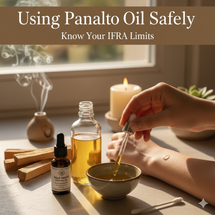Posted by Jonathan Raabe on Oct 20th 2025
Using Palo Santo Oil Safely: Know Your IFRA Limits
Using Palo Santo Oil Safely: Know Your IFRA Limits
Palo Santo essential oil, derived from the wood of Bursera Graveolens
The International Fragrance Association (IFRA) sets standards for the safe use of fragrance ingredients
| IFRA Category | Product Examples | Maximum Usage Level (%) |
| Category 1 | Lip Products/Toys | 0.00 |
| Category 2 | Deodorant/Antiperspirant/Body Spray/Body Mist | 2.16 |
| Category 3 | Eye Products/Make-up/Facial Treatment Masks | 3.85 |
| Category 4 | Perfume/Solid Perfume/Fragranced Bracelets | 40.45 |
| Category 5A | Body Creams/Leave-on Body Products | 10.34 |
| Category 5B | Face Creams/Beard Oil/Leave-on Face Products | 5.26 |
| Category 5C | Hand Creams/Hand Sanitizers/Leave on Hand Products | 7.14 |
| Category 5D | Baby Creams/Baby Oils/Baby Products | 1.78 |
| Category 6 | Mouthwash/Toothpaste/Breath Spray | 0.00 |
| Category 7A | Rinse off Hair Treatments | 6.29 |
| Category 7B | Leave on Hair Treatments | 6.29 |
| Category 8 | Intimate Wipes/Baby Wipes | 1.78 |
| Category 9 | Rinse Off and Bathwater Products/Soap/Shampoo | 22.55 |
| Category 10A | Household Cleaning Products/Reed Diffusers | 22.55 |
| Category 10B | Air Freshener Sprays | 62.03 |
| Category 11A | Diapers | 1.78 |
| Category 11B | Scented Clothing | 1.78 |
| Category 12 | Candles/Incense/Air Freshening Crystals, Liquids, Solids | 100 |
Note: It is the responsibility of our customers to ensure the safety of the final product containing the fragrance oil by conducting thorough testing
Understanding and Avoiding Skin Irritation
Certain components found in Palo Santo oil have the potential to cause skin irritation or allergic reactions, especially if the oil is used without proper dilution or if an individual has a pre-existing sensitivity.
Key components known for potential irritation include:
-
Limonene: A major constituent of Palo Santo, limonene can act as a skin irritant and allergen, particularly when it oxidizes after exposure to air. This may result in contact dermatitis, presenting as redness, itching, or a rash.
-
Alpha-terpineol: This component is classified as a skin and eye irritant and can cause a sensitization reaction in some people with prolonged exposure.
-
P-cymene: Direct contact with this compound is known to cause skin irritation. Repeated exposure can lead to the defatting of the skin, potentially causing cracking or dryness.
-
Carvone: As a mild skin sensitizer, carvone may cause allergic contact dermatitis in some individuals, often visible as an itchy, red rash.
-
Pulegone and Menthofuran: These compounds, often found in mint-family plants, can cause allergic contact dermatitis and skin irritation in sensitive individuals.
Best Practices for Safe Topical Use
To help minimize the risk of skin irritation or allergic reaction when using Palo Santo oil topically:
-
Dilute the oil: Always mix Palo Santo essential oil with a carrier oil, such as jojoba or coconut oil, before applying it directly to the skin.
-
Perform a patch test: Before using the diluted oil over a larger area, apply a small amount to an inconspicuous spot of skin. Wait 24 to 48 hours to check for any adverse reactions.
-
Use caution with sensitive skin: People with sensitive skin, as well as infants and children, should either use extra caution or avoid topical application entirely.
This information is for general purposes only. For medical diagnosis or advice, consult a professional.

